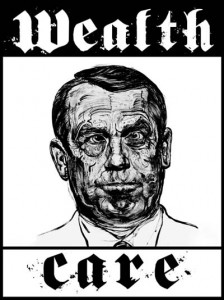There is a reason why governments refuse to give in to demands from hostage-takers: because otherwise it encourages more hostage-taking. That is an obvious lesson, but it seems it has taken Democrats many years to learn it, as they have faced Republican strategies of grabbing hostages for decades and have quietly given in, paying ransom again and again.
Yet on those rare occasions when Democrats do stand up -- such as against House Speaker Newt Gingrich's government shutdowns in 1995-1996 and against House Speaker John Boehner's blockage of a payroll tax cut extension this week -- the Democrats usually prevail politically.
Still, that hasn't stopped the Democrats from sliding back into submission the next time the Republicans do it. That's because standing up to hostage-takers often involves absorbing some short-term pain, like seeing more Americans thrown out of work or watching the U.S. credit rating damaged.
Knowing that the Democrats are hesitant to take those hits, Republicans have held the U.S. economy hostage to extract concessions from President Barack Obama on GOP priorities. Indeed, the practice began immediately after the Republicans won the House majority in 2010.
The Republicans vowed to block extension of long-term unemployment insurance and other recession-related programs unless Obama agreed to continue George W. Bush's tax cuts for the rich for two more years. Obama gave in, but he also failed to insist on including a rise in the debt ceiling for government borrowing.
Obama explained that he left the debt ceiling out of the 2010 deal because he didn't believe anyone would be so reckless as to risk forcing the U.S. government into default. However, in summer 2011, Republicans did just that, holding the debt-ceiling bill hostage unless they got more concessions, which Obama again agreed to grant.
The Republicans understood that by holding the U.S. economy hostage, it's pretty much a win-win for them. Either they extract more political ransom from Obama or they allow unemployment to stay high, in which case they can count on the U.S. news media and the public blaming Obama. That, in turn, improves their chances of winning the White House and Congress in November 2012.
So, it shouldn't have come as a surprise this past week when House Republicans balked at a short-term extension of payroll tax cuts for 160 million working Americans and long-term unemployment insurance for those looking for work. This was just one more opportunity to grab hostages, demand more concessions and make the economy scream.
Yet, by taking his jobs plan to the public -- a strategy that Obama has been pursuing since the debt-limit fiasco last summer -- has Obama finally been able to make the Republicans pay for their hostage-taking strategy. Faced with national outrage, Speaker Boehner sounded retreat on Thursday, although more hostage-taking can be expected early in the New Year when a longer term extension is negotiated.
The Nixon Legacy
After all, this hardball Republican approach to politics did not begin in 2010. The pattern can be traced back to Richard Nixon's presidential campaign of 1968 when his political team, in essence, took the half-million American soldiers in Vietnam hostage.
According to documents and audio recordings that have surfaced over the intervening decades, it is clear that Nixon's campaign sabotaged President Lyndon Johnson's Paris peace talks by getting the South Vietnamese leadership to boycott the negotiations in exchange for Nixon's promises of a better deal once he was in the White House.
In October 1968, the peace talks were on the verge of ending the conflict which had already claimed more than 30,000 U.S. lives and a million or so Vietnamese. However, Nixon feared that a last-minute settlement of the war would likely give Vice President Hubert Humphrey the boost he needed to win the election. So, Nixon's operatives made sure that didn't happen.
Johnson learned of Nixon's gambit, which the President called "treason" in one phone conversation. Johnson even confronted Nixon over the phone about the sabotage, but Nixon simply denied the accusations, leaving Johnson with the choice of whether to release the evidence before the 1968 election.
Johnson consulted with Secretary of State Dean Rusk and Defense Secretary Clark Clifford on Nov. 4, 1968. Both advised against going public out of fear that the evidence of Nixon's treachery might reflect badly on the United States.
"Some elements of the story are so shocking in their nature that I'm wondering whether it would be good for the country to disclose the story and then possibly have a certain individual [Nixon] elected," Clifford said in a conference call. "It could cast his whole administration under such doubt that I think it would be inimical to our country's interests."
(Note: You can view every article as one long page if you sign up as an Advocate Member, or higher).






